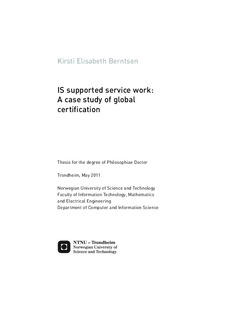IS supported service work: a case study of global certification
Doctoral thesis
Permanent lenke
http://hdl.handle.net/11250/252411Utgivelsesdato
2011Metadata
Vis full innførselSamlinger
Sammendrag
The thesis approaches the issue of IS support for service work, understood as distributed knowledge work taking place as a negotiation between diverse interests. It is based on an ethnographically inspired, longitudinal case study of certification auditing according to a formal generic standard. A handful of certification auditors are followed closely, periodically and comprehensively over three years. Observations are combined with interviews of subjects and colleagues, added by exploration of other material. The practices of company ‘W’ is placed within a larger historical and institutional context.
Research literature and theory is explored in four chapters from Social studies of science (STS), Computer supported cooperative work (CSCW), Information systems (IS), Information infrastructures (II) and Management literature. The aim is to identify basic characteristics of service work, its opportunities and challenges, from both the company’s and workers’ perspective. Main topics are Decision Making as negotiated sensemaking, contextual rationality and judgement; Sharing of understanding and meaning as ongoing practiced articulation work aiming for trust and an equifinal level of accord that will ‘find and allow common action’; Perseverance in a capable role that will allow calibration of distributed knowledge is vital for auditors. Common Information Spaces (CIS) is used as a framework to explore the heterogeneous circumstances of identity work in work practices; Predictability in production is sought through various strategies of standardization. Approaches to avoid and counter the inherent side-effects of standardization are described. The empirical results of the research project are presented and analysed in four chapters that look at the issue of i) being an accomplished service worker and ii) practicing service work. Both issues are addressed from a local, individual perspective, and from an organizational perspective in terms of the continuation of quality production.
The thesis closes with a Conclusion of organized and standardized service work as displaying Practical drift, in response to the research question RQ0. How is IS supported distributed service work negotiated?, followed by implications for IS research and practice. The empirical case displays the role of information systems (IS) support in distributed service work - as part of a larger assembly of standardization measures, a broad-spectrum approach, displaying practical drift in its effect. The service work of certification auditing is characterized by ongoing negotiation of partly contradictory interests. It is heterogeneously standardized through material, rational/immaterial and social/organizational measures, many in place long before the advent of advanced IS. Traditionally, there are release mechanisms that, on the auditors’ discretion, alleviate the inappropriate effects of standardization. With new harmonising efforts the scope of this personal latitude needs to change, but when first implemented the IS along with new procedures start off as too tight. However, over time adaptations are made, making the overall process self regulatory with feedback mechanisms.
On the whole, the thesis aims to contribute to the literature on information infrastructures, on knowledge work in general, and CSCW by drawing on insights from this specific collaborative work in controversial settings. The case provides practical insights for resilient systemizing of knowledge based global service work practices.
